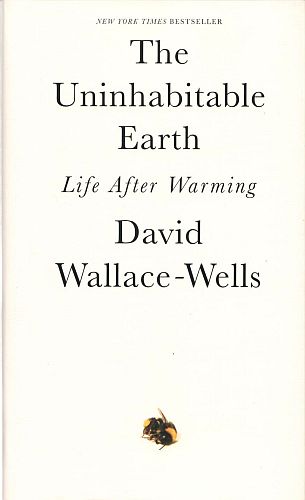

| THE UNINHABITABLE EARTH Life After Warming David Wallace-West New York: Tim Duggan Books, February 2019 |
Rating: 4.5 High |
|||
| ISBN-13 978-0-525-57670-9 | ||||
| ISBN-10 0-525-57670-3 | 310pp. | HC | $27.00 | |
| Page 13: | "At three degrees, southern Europe would be in permanent drought, and the average drought in Central America would last nineteen months longer and in the Caribbean twenty-one months longer. In northern Africa, the figure is sixty months longer—five years." |
| Inconsistency: On page 12, he writes "Hit our Paris emissions targets and we may still get four degrees of warming, meaning a green Sahara and the planet's tropical forests transformed into a fire-dominated savannah." The Sahara is part of northern Africa. |
| Pages 42-43: | "This is among the things cosmologists mean when they talk about the utter improbability of anything as advanced as human intelligence evolving anywhere in a universe as inhospitable to life as this one; every uninhabitable planet out there is a reminder of just how unique a set of circumstances is required to produce a climate equilibrium supportive of life. No intelligent life that we know of ever evolved, anywhere in the universe, outside of the narrow Goldilocks range of temperatures that enclosed all of human evolution, and that we have now left behind, probably permanently." |
| At present, we know of exactly one form of intelligent life: us. No competent statistician would conclude anything from a sample size of one. I understand the author's point that we are foolishly screwing up the stable temperature environment that nurtured our civilization, and it is a fair one; but he should not try to draw that lesson from the larger universe, for the universe is not only stranger than we imagine, it is stranger than we can imagine. |
| Pages 45-46: | "There is not much carbon in the air, all told, just 410 parts per million, but it is everywhere, and so relying on carbon capture globally could require large-scale scrubbing plantations nearly everywhere on Earth—the planet transformed into something like an air-recycling plant orbiting the sun, an industrial satellite tracing a parabola through the solar system." |
| Geometry goof: A parabola is not a closed curve, and does not define an orbit. Also, "Sun" — not "sun". |
| Page 51: | "The divide ran through Texas, Oklahoma, Kansas, Nebraska, and the Dakotas, and stretches south into Mexico and north into Manitoba..." |
| Presumably it still crosses those six states. Verb tense error: S/B "runs through". |
| Page 62: | "We haven't even gotten to inland flooding— when rivers run over, swollen by deluges of rain or storm surges channeled downstream from the sea." |
| Direction: surely S/B "upstream". |
| Page 76: | "Fires of that scale happen now every year." |
| Ease of pronunciation: S/B "now happen". "Why do they want the Duke's son killed?" |
| Page 94: | "Along with everything else it does, oceans feed us: globally, seafood accounts for..." |
| Number error: S/B "they do". |
| Page 101: | "...there are many, many more fossil fuel chimneys disgorging their trails of black smoke than fission facilities with their finger-trap towers and clouds of white vapor." |
| This term took me a while to puzzle out. I finally realized that it alludes to the Chinese finger tubes which, when you compress them to free your trapped digits, become wider at the ends to resemble the silhouette of a cooling tower. Still, it's an odd association for the author to make. |
| Page 107: | "Often grouped together under the umbrella term 'geoengineering,' this prospect has been..." |
| Extra word: S/B "grouped". |
| Page 110: | "Scientists suspect smallpox and the bubonic plague are trapped in Siberian ice, among many other diseases that have otherwise passed into human legend..." |
| Unlike smallpox, the bubonic plague is still "in the wild," so to speak. |
| Page 113: | "Those that survive are far from robust,, many having scratched so incessantly at their own hides to clear it of ticks that they completely eliminated their own hair..." |
| Number error: S/B "to clear them of ticks" or better "to dislodge the ticks". |
| Pages 128-129: | "But most wars throughout history, it is important to remember, have been conflicts over resources, often ignited by resource scarcity, which is what an earth densely populated and denuded by climate change will yield." |
| Capitalization: S/B "Earth". |
| Page 168: | "...which would have the perhaps unintended effect of clearing from the stage all of the most obvious villains and their guardians, leaving no easy marks to which we might apportion blame and expect commensurate payback." |
| Missing words: S/B "and from which we might expect commensurate payback". |
| Page 177: | "...a perception that the world is being almost entirely remade, but in a way that leaves you, as delighted as you may be by Netflix and Amazon and Instagram and Google Maps, more or less exactly where you were before." |
| Usage: S/B either "exactly" or "more or less". (Ref: Frank Sinatra's character in The Manchurian Candidate.) |
| Page 181: | "And if they work, carbon capture plants will deliver industrial absolution for industrial sin—and initiate, as a result, a whole new theological romance with the power of machine." |
| Usage: reads awkwardly. To make it work, S/B either "the power of Machine" — implying some personified entity — or "the power of the machine". (I enjoy the eating of apple.) |

 To contact Chris Winter, send email to this address.
To contact Chris Winter, send email to this address.